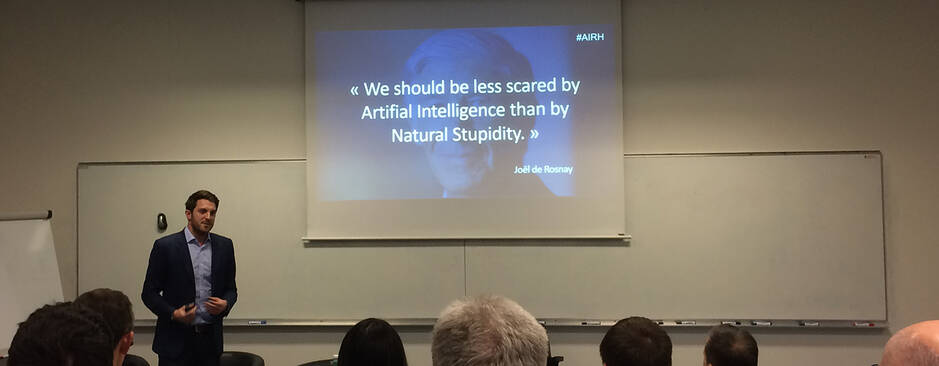Impact of AI and Robotics on the labor market
Will AI and Robotics take your job or do they make you more skilled and generate alternate types of employment? The first panel of the ‘AI, Robotics & Work’ Conference at HEC Paris on March 12, intended to answer these questions.

By Divyabh Tyagi, HEC Paris MBA student
The panel was moderated by Frederic Godart, Associate Professor and Academic Director (HEC Paris Luxury Certificate). The panel discussion focused on how AI and Robotics is affecting the labour market in today’s global world. The moderator invited Meghan Anzelc, Head of Data & Analytics at Spencer Stuart, Louis Coudlon, Co-founder & Head of Global Sales @ CleverConnect (Meteojob, Visiotalent, HRmatch) and Paola Tubaro, a Research Scientist at CNRS Paris, to share their insights on the issue at hand.
The speakers shared their perspectives on a wide array of topics ranging from definition and uses of AI in today’s fast changing world along with its applications in various industries. There are differing opinions shared on how AI and Robotics are affecting the labour market. The viewpoints of the panellists varied with examples from fields such as retail, insurance, talent search and academic research, which lent a rich myriad of perspectives that were truly appreciated by the audience.
What is AI and what are its applications?
Meghan Anzelc started the presentation by defining AI and giving numerous examples of its applications in industry. She highlighted the use of AI in banks to solve tasks such as depositing cheques. Textio, an augmented writing platform, uses data to reveal meaningful patterns in language, guiding you to stronger communication and better business outcomes. Having a rich experience in using AI and data analytics, Meghan shared here experience about how AI is driving developments in the Insurance industry. Moving on to Robots, she discussed vividly how Robotic Process Automation (RPA) automates repeatable processes across multiple applications.
The second presenter, Louis Coudlon elucidated how AI is changing the dynamics in the recruitment industry. By giving examples of his start-up, he illustrated how AI is being increasingly used by corporates to match applicants with jobs and to match recruiters with the candidates with the desired skills.
Types of AI
Louis very aptly suggested the differences between Weak AI and Strong AI. Where in weak AI, the devices cannot follow the tasks on their own, in strong AI the devices are self-conscious and can actually think and perform tasks on their own like a human being. Today, most devices use a weak AI and not a strong AI.
Should our computers and robots think for themselves, and should we worry they might take over if they could ? Well, that is where the concept of Rationalizing AI and Enhancing AI bears significance. While in Rationalizing AI, the device replaces human beings, in Enhancing AI, the final decision maker will be a human being and AI will be only used as an enabler (For example: use of AI in curing Skin cancer)
Risks of AI in recruiting
As every technology comes with its own perils, so does AI. Louis gave a unique perspective on how in spite of its benefits, AI introduces biases during CV screening which might not lead to selection of the right candidate. In video interviews, for instance, while using a combination of AI and facial analysis that measures and examines such behaviors as word choice, gestures, and voice inflections. Now, if the technicians developing these tools commit certain kinds of errors in gathering their input data or building machine learning systems, unintentional bias could take place.
The ‘Human’ touch in AI
Paola Tubaro provided fresh perspectives stressing the fact that ‘Human intelligence supports AI’. Thus, in spite of a huge growth in data, the role of humans will always remain for tasks in various capacities such as checking output for accuracy, proof checking, etc. She defined human contribution as ‘micro work’. Micro work is an essential contributor to AI.
Overall, the common consensus in the panel discussion was that in order to create ethically responsible AI, we need to address labor standards in the process of data preparation. Also, there needs to be a focus on using AI reasonably and responsibly. On whether AI and Robotics will take away jobs, the arguments of the panellists were that there is a need to re-skill the workforce and with automation, there would a new host of tasks for which we need to upskill workers. This was supplemented by a 2007 report from McKinsey highlighting the fact that ‘Very few occupations—less than 5 percent—consist of activities that can be fully automated.’
Indeed, a wonderful panel discussion, which gave me such insightful perspectives on how AI and Robotics are influencing the labour market.
Divyabh Tyagi is an MBA student at HEC Paris. A digital enthusiast by passion, he has over 7 years of experience in consulting clients across energy, automotive and manufacturing sectors on developing digital strategies to increase operational effectiveness and driving business growth. Connect with him on LinkedIn to discuss more about the article